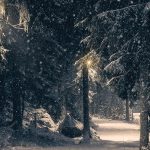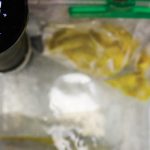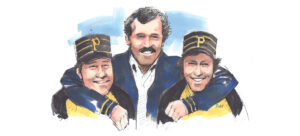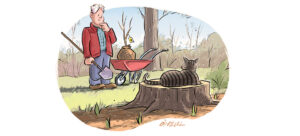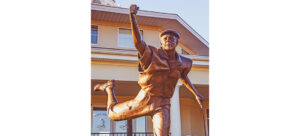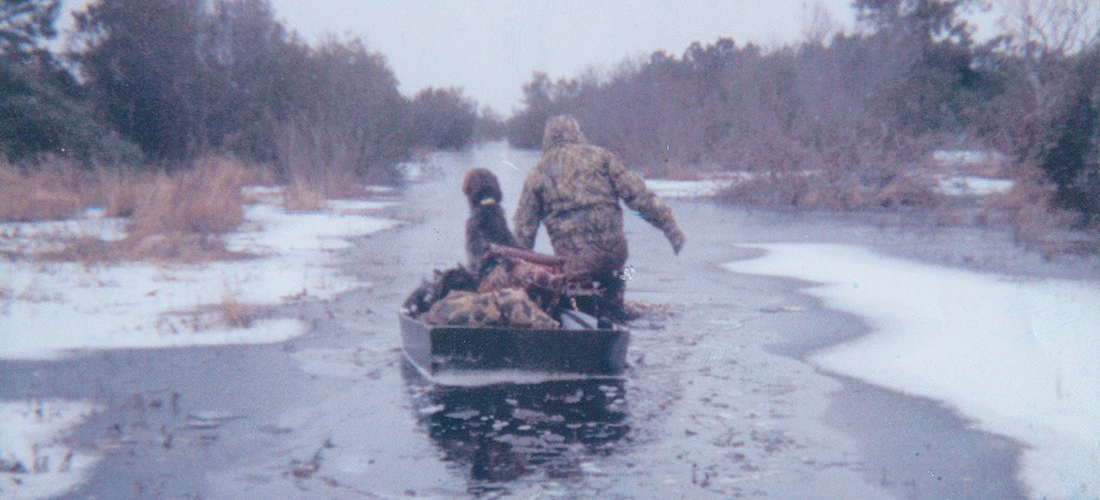
Black Dark
Sleet, snow, ducks and a dog
By Tom Bryant
Old duck hunters call it black dark. That’s when you crawl out of a warm bed at three in the morning, wander sleepily to the door of the cabin in your skivvies, stick your head out to check the weather, and report back to the boys. The guys are slowly muttering, pulling on long underwear and heavy socks before grabbing a cup of coffee. You report, “Men, it’s sleeting mixed with snow, colder than Aunt Sylvia’s horse holder in January, and black dark. It’s perfect!”
That’s the way it was on one of my last duck hunts at Bob Hester’s duck club right off Lake Mattamuskeet. Black dark. When we trooped out of the little motel where we were staying for the duration, sleet was falling, bouncing off our hats like little grains of sand. As we loaded up and drove out of town toward Bob’s barn, the headquarters for the day’s hunt, Bryan said, “Man, it’s black dark out there.”
The little town of Engelhard has a few pole lights on street corners, and some of the stores were lit with night lights, but it didn’t take long to leave the town with its soft glow and move into the blackness of the country.
Bryan followed up his darkness statement with, “I hope y’all brought your flashlights.” I remembered the little Mag flash I had repacked with new batteries. I remembered the batteries but didn’t remember putting the little light in my gunning bag. Could be trouble, I thought.
The headlights of the truck pierced the coal-black night with just enough brightness that we saw the turn to Bob’s farm as we rode by it. Bryan stopped the truck, backed up, made the turn, and it was a short ride to the barn where we would get our marching orders.
There were two big pole lights on either side of the barn, creating a halo effect with the sleet and snow reflecting back on the building. Bob was inside his walled-off office with his feet propped up on his desk, leaning back next to a glowing, cherry-red woodstove that radiated heat across the room.
Bob Hester is famous across the Southeast with diehard duck hunters. He has gained his reputation after many years of studying species of ducks and their habitats. As Big Tom, a resident of Fairfield and the owner of a thriving duck cleaning business, says, “Mr. Bob knows more about ducks than ducks know about ducks.”
“Well, boys,” Bob said as he dropped his feet off the desk and stood up, “I hope y’all are ready to do some serious ducking. The weather’s right, and the ducks are here. It ought to be a good hunt. Grab your gear and let’s load up. You’ll need flashlights. It’s black dark out there.”
We hustled to the truck, pulled on our waders, grabbed our gunning bags and shotguns, and lastly, pulled out our flashlights. Luckily, I found my light just where I had stowed it, in the top pocket of my bag. It’s one of those waterproof stainless steel Mag lights about the size of a candle and works great in close quarters, but if I had to light up any distance, I was out of luck.
We crammed ourselves in the open bed of Bob’s pickup, and he looked in the back just before cranking up and heading out. “You boys all loaded and ready? It’s about a 15-minute ride. Hang on to your gear. There’s a couple of wet spots I’ll have to negotiate before we get there. Could be some slipping and sliding.”
He was right. The dikes we were driving over had holes from the weather and from regular wear and tear. Muskrats didn’t help as they dug and undermined the sides of the dikes in some cases.
Bryan’s little dog, Babe, snuggled up under my legs trying to escape some of the snow that was coming down harder. Babe was a Wirehaired Pointing Griffon and will retrieve anything from a duck to a squirrel; and as it worked out, she would see a lot of action before the morning was over.
After a short time, Bob’s truck slowed and came to a stop. He stepped out of the cab and said, “OK, boys, this is the jumping-off point.” He shined his big handheld spotlight out across the black water. As we unloaded from the bed of the truck, we watched with some trepidation as the light illuminated the tree line.
“The boat with the decoys is right here on the bank. If I was you, I’d put my coats in the boat until you wade across the canal. The water is a little deep and will come up right high on your waders, probably wet your coats if you leave ’em on. The canal ends right yonder.” He pointed his light to the low growing brush at the beginning of the swamp on the other side of the deep black canal water. It was about 30 yards.
We loaded our gear along with our coats and prepared to shove the skiff off the bank. Bob pointed to me. “Tom, you’re the tallest, go ahead and step in so we can see how high the water is on you.”
“Why don’t I paddle the little boat over to the other side and then step in where it’s shallow.”
“Naw, wouldn’t work. That skiff wouldn’t hold you. She’d sink.”
I looked down at the inky dark water, took a breath, and eased myself down. The water came up over my hips, but I had enough free board on my waders to make it across, unless I stepped in a hole.
Bob shined his big light toward what looked like a cut in the brush on the other side. “See that hole in the brush? You can put your coats on when you get there. It’s relatively shallow after that. Red survey tape placed on some trees will mark the way to the blind. It’s a couple hundred yards. I’ll come back and pick you up around noon. Y’all wear ’em out.”
He climbed into his truck, and we watched as the glow of his taillights disappeared down the dike. It was black dark, and our little lights were like pinpricks in the darkness. It started sleeting in earnest, looking like little pebbles splashing in the canal channel.
Bryan put Babe in the small skiff, and I pulled it over to the cut in the brush, then put on my hunting coat. The sleet changed to snow.
It didn’t take long for us to assemble on the other side and start our forced march across the sleet-covered marsh toward the blind. Bryan’s little dog stayed in the skiff with the gear and decoys as if to say, “I ain’t getting out there. Are you crazy?”
The hunt was many years ago, and it was to go down in the journal as one of the best. Hester has since taken his club super private, which means I can no longer afford it. Neither can any of my hunting buddies. All we have now are memories of what Hester called the “woods blind,” the snow on that winter morning, and that expression of old duck hunters: The night was truly black dark. PS
Tom Bryant, a Southern Pines resident, is a lifelong outdoorsman and PineStraw’s Sporting Life columnist.

